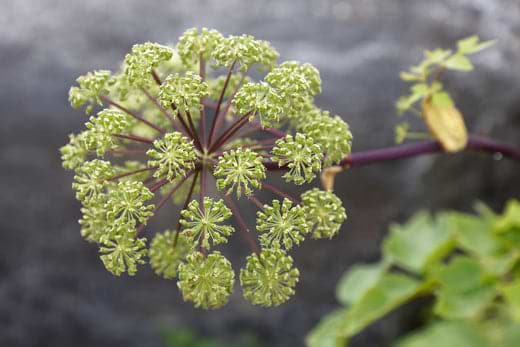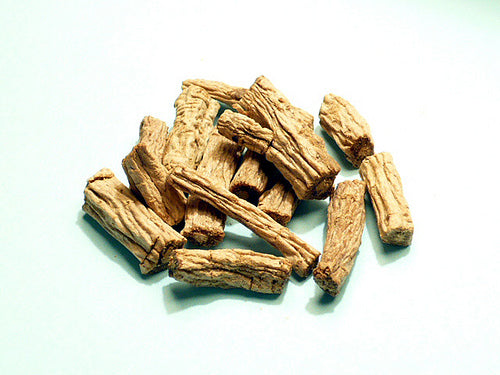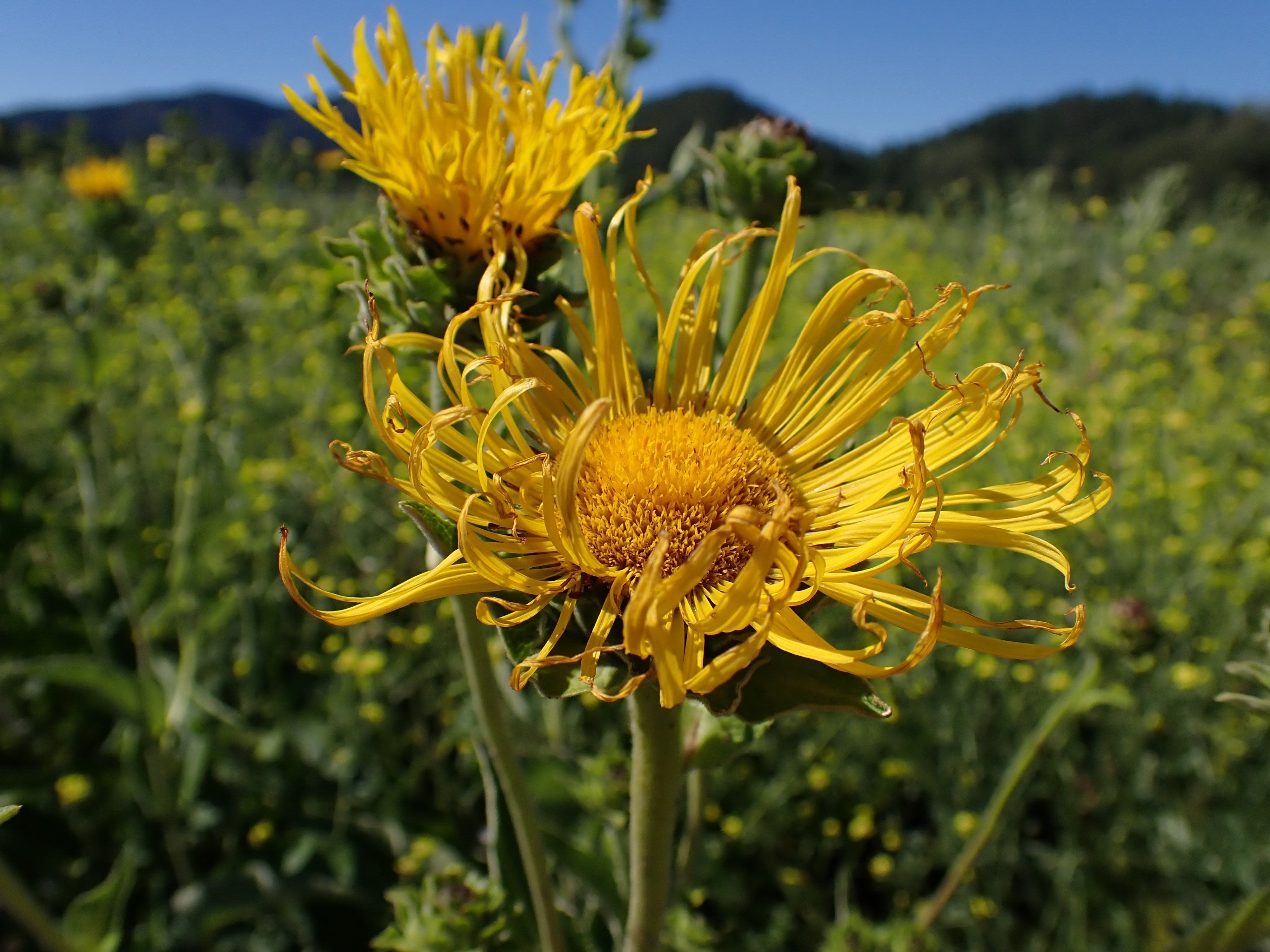
Angelica Archangelica Health Benefits & Medicinal Uses (plus a Recipe)
Written by Rebecca Younger, CH, CDShare
Legend has it, angelica was no ordinary herb. In the 14th century, the Archangel Michael himself whispered its secrets to a monk, revealing its power to fend off the plague. This divine endorsement didn’t just give angelica its name (Angelica archangelica); it also crowned it a botanical superstar. Fast forward centuries, and angelica remains a wellness wonder, celebrated for its bold versatility and centuries-long track record of coming to the rescue in times of need.
While angelica belongs to the same botanical family (Apiaceae) as her cousins fennel, anise, caraway, parsley and chervil, angelica's distinctive aroma tells a different story - one of deep earth magic and ancient wisdom. Among her relatives, you'll also find the revered osha (bear root), another aromatic treasure with its own uniquely sublime scent signature. Together, these plants remind us of nature's endless creativity in crafting distinct plant personalities, even within the same family.
Used to make perfume and fragrant liqueurs, angelica's unique essential oils also make it an effective respiratory and digestive aide. These powerful essential oils are also the reason why angelica is used to make digestive bitters, as well as a flavoring agent for liqueurs such as Benedictine, Vermouth, Dubonnet and Chartreuse. Angelica is also used in the distillation of gin and absinthe. The stems are candied for culinary purposes and the leaves are used to flavor fish, poultry, soups and stews.
History of Angelica
Angelica has a rich history woven with folklore, especially in European and Celtic traditions. It was a revered herb in the Celtic festival of Imbolc, where its leaves were scattered to purify spaces. Across medieval Europe, angelica was worn as a charm to ward off disease and bad energy. In Scandinavia, the Saami people treated it as a sacred herb as early as the 12th century.
Cultivated since the 10th century, A. archangelica became a staple in folk medicine for digestive support, respiratory health, and general vitality. And angelica’s reputation traveled well—Native American tribes in the U.S. also used different Angelica species for digestive and respiratory discomforts, showing us just how universally valued this herb became.
Health Benefits of Angelica
Angelica is like a wellness multitool, supporting digestion, respiratory function, circulation, and boosting immunity. Here’s a deeper look at what this herb can do:
Respiratory Health Benefits
Angelica is renowned for its warming tonic properties that support respiratory health. By promoting healthy airflow and clearing the lungs, it serves as a gentle yet effective respiratory aid. The essential oils in angelica are particularly beneficial for those seeking natural support for their respiratory system.
- Promotes healthy airflow and clears the lungs
- Supports respiratory function with its warming properties
- Ideal for use in respiratory wellness formulas
As you explore natural ways to enhance respiratory health, consider incorporating angelica into your herbal routine for its unique benefits.
Digestive and Gut Support
Angelica is a powerful digestive ally, renowned for its bitter properties that stimulate digestive secretions and improve overall gut health. Here’s how angelica supports your digestive system:
- Stimulates Digestive Secretions: Angelica's bitter compounds support the secretion of saliva, bile, and gastric juices, which are crucial for breaking down food and absorbing nutrients efficiently.
- Eases Bloating: By enhancing digestive efficiency, angelica helps expel excess gas and ease bloating, providing relief from discomfort after meals.
- Improves Appetite: Angelica's ability to support digestive secretions and enzyme production can also enhance appetite, making it beneficial for those experiencing a lack of hunger.
- Supports Regular Bowel Movements: The herb’s affinity for the digestive tract can help promote regularity, helping to alleviate occasional constipation and maintain a healthy digestive tract.
- Aids in Nutrient Absorption: By optimizing digestion, angelica ensures that the body absorbs essential nutrients more effectively, contributing to overall health and vitality.
- Versatile Culinary Addition: Beyond its digestive benefits, angelica adds a delightful flavor to culinary creations, making it a versatile addition to your kitchen. Its unique taste can enhance dishes like stews, soups, and even desserts.
Whether you're looking to enhance digestion before meals or soothe occasional discomfort, angelica offers time-tested support for a healthy digestive system.
Blood Flow Boost
With its warming and blood-moving properties, angelica is a circulatory tonic that promotes healthy blood flow. Herbalists often recommend it for supporting menstrual health and regulating cycles, drawing parallels to the traditional use of Angelica sinensis (dong quai) in Traditional Chinese Medicine. Angelica's ability to enhance circulation makes it a valuable herb for overall vitality.
- Promotes Healthy Circulation: Angelica's warming properties support healthy blood vessels, which help with circulation and ensuring that oxygen and nutrients are efficiently delivered throughout the body.
- Supports Healthy Menstrual Flow and Cycle Regulation: By supporting blood flow, angelica assists in regulating menstrual cycles and easing discomfort, making it a popular choice for menstrual health support.
- Enhances Vitality: Improved circulation leads to increased energy levels and vitality, contributing to overall well-being and resilience.
- Similar Benefits to Dong Quai in Traditional Chinese Medicine: Like its cousin, dong quai, angelica is used to balance hormones, providing overall support for women's health.
- Potential Cardiovascular Benefits: Angelica's circulatory properties may also support heart health by maintaining healthy blood pressure levels.
Angelica's circulatory benefits extend beyond menstrual health, offering various health benefits and potential support for various aspects of well-being.
Immunity Boost
Angelica is known for its ability to induce gentle sweating, which helps warm the body and support immune resilience. This quality is particularly useful when you're feeling run-down and in need of an extra boost. By incorporating angelica into your wellness routine, you can fortify your immune defenses naturally.
- Induces gentle sweating to warm the body
- Supports immune resilience during times of need
- Ideal for use when feeling run down
Angelica's immune-boosting properties make it an excellent companion during seasonal transitions and times of stress.
Whether you’re looking to support lung function, soothe digestion, support circulation, or keep your immune system strong, angelica has a time-tested track record. Its diverse benefits make it a compelling choice for those seeking natural wellness solutions.
Synergistic Herb Combinations
Angelica plays well with others, and pairing it with complementary herbs can enhance its benefits:
- Mullein: For respiratory health, mullein and angelica are a dream team, working together to clear and tone the lungs.
- Dong Quai (Angelica sinensis): For menstrual and circulatory support, angelica pairs beautifully with its cousin dong quai. Together, they support healthy blood flow and hormone balance.
- Fennel: Fennel’s gentle digestive support works well with angelica’s bitter profile, making them a great combo for bloating and gas.
- Ginger: For an extra warming kick, ginger and angelica help support circulation and digestion, ideal during colder months.
Blending angelica with these herbs creates well-rounded support for specific health goals, whether respiratory, digestive, or circulatory.
How to Use Angelica
Angelica is as versatile as it is powerful. Here’s how you can incorporate it into your wellness routine:
- Teas: Angelica tea is soothing and easy to prepare. It’s a lovely option for respiratory support and gentle immune boosting.
- Tinctures and Extracts: For a quick and potent dose, angelica tinctures or extracts are a great choice. You can take a few drops in water or juice before meals.
- Digestive Bitters: Make your own or look for digestive bitters with angelica as a main ingredient. Taken before meals, it can stimulate digestion and ease bloating.
- Topical Use: The essential oils in angelica make it effective in topical preparations for soothing irritated skin and mild wounds. Look for creams or oils containing angelica extract.
If you’re new to angelica, start with a small dose, especially if you’re using it for the first time or have any sensitivities. As always, consult a healthcare provider if you’re taking medications or have specific health concerns.
The Power of Liquid Herbal Extracts
Why choose liquid herbal extracts over other forms? These concentrated tinctures offer several advantages that make them a superior choice for herbal supplementation:
- Fast-Acting Benefits: Liquid extracts bypass the digestive process required for breaking down pills or capsules, allowing for quick absorption directly into your bloodstream.
- Superior Absorption: Your body can absorb liquid herbs more efficiently than solid forms, making more of the beneficial compounds available for use.
- Easy to Customize: Liquid extracts are simple to adjust for your needs.
- Long Shelf Life: When properly stored, liquid herbal extracts maintain their potency for extended periods.
WishGarden Products Featuring Angelica

At WishGarden, we rely on angelica’s powerful lung supporting actions in our Deep Lung formula, which supports clear, healthy lungs. Whether you’re tackling seasonal respiratory challenges or just want to keep your respiratory system in top shape, angelica brings warmth, circulation, and comfort to our blend.
Herbalist Q&A: Angelica archangelica
Q: What does angelica smell like?
Angelica has a distinct aroma that is both earthy and sweet, with hints of musk and spice. Its fragrance is often described as warm and inviting, making it a popular choice for essential oils and perfumes. This unique scent profile sets angelica species apart from its botanical relatives, adding to its allure in both culinary and medicinal uses.
Q: What does Angelica archangelica taste like?
Angelica archangelica has a complex flavor profile that is both sweet and slightly bitter, with earthy undertones. Its taste is often described as musky with hints of celery and juniper, making it a unique addition to culinary dishes and beverages. This distinct flavor is why it's commonly used in liqueurs and as a flavoring agent in various recipes.
Q: How do you grow Angelica archangelica?
Angelica archangelica thrives in cool climates and prefers moist, well-drained soil with partial shade. To grow this medicinal plant, start by sowing seeds in early spring or late autumn, as they require cold stratification to germinate. Space the seeds about 18 inches apart to allow for their large size. Ensure the soil remains consistently moist but not waterlogged. As the plants grow, they can reach up to six feet in height, so staking may be necessary to support their tall stems. Angelica typically flowers in its second year, producing umbels of small white or greenish flowers. Regularly prune dead or damaged foliage to maintain the plant's health and encourage vigorous growth.
Q: Is Angelica archangelica the same as Dong Quai?
No, Angelica archangelica and dong quai are not the same, though they belong to the same botanical family, Apiaceae. Angelica archangelica, often referred to as garden angelica or wild celery, is native to Europe and is renowned for its distinct aroma and uses in culinary and medicinal applications. In contrast, dong quai, also known as Angelica sinensis, is a staple in Traditional Chinese Medicine, celebrated for its benefits in women's health, particularly for menstrual and hormonal balance. While both share some medicinal properties and uses, they are distinct species with different traditional applications and growing regions.
Q: How long does it take to notice the effects of angelica?
Many people experience digestive benefits from angelica within minutes when using a tincture or bitters, as these forms are quickly absorbed by the body. This rapid effect can be particularly helpful for easing bloating and enhancing appetite before meals. For respiratory support, especially when using a blend like WishGarden’s Deep Lung, it may take a few days of consistent use to notice significant improvements. This gradual effect allows the essential oils and other active compounds in angelica to support respiratory function and promote healthy airflow over time.
Angelica isn’t just another pretty plant—it’s like that reliable friend who’s always got your back when things get a little off-balance. With regular use, this herb can help keep your respiratory and digestive systems humming along in harmony, boosting your overall vitality and well-being. But that’s not all: when you make angelica a part of your wellness lineup, it’s like giving your circulation and immune system a VIP upgrade. Talk about a holistic health hero!
Of course, everybody is unique (you’re a masterpiece, after all), so results may vary. That’s why it’s always smart to chat with your healthcare pro to make sure this herbal gem fits perfectly into your wellness puzzle. Ready to embrace the power of nature? Angelica might just be the missing piece. 🌿
Rebecca Younger is passionate about herbs and women's health. She aspires to plant seeds of inspiration within her community about plant medicine and healthier ways of life. She studied Herbal Medicine at Herbalism Roots in Denver and is a certified Doula through the Matrona Foundation. She is the Brand Communications Specialist at WishGarden Herbs.
For educational purposes only. This information has not been evaluated by the Food and Drug Administration. This information is not intended to diagnose, treat, cure, or prevent any disease, or to sell any product.















